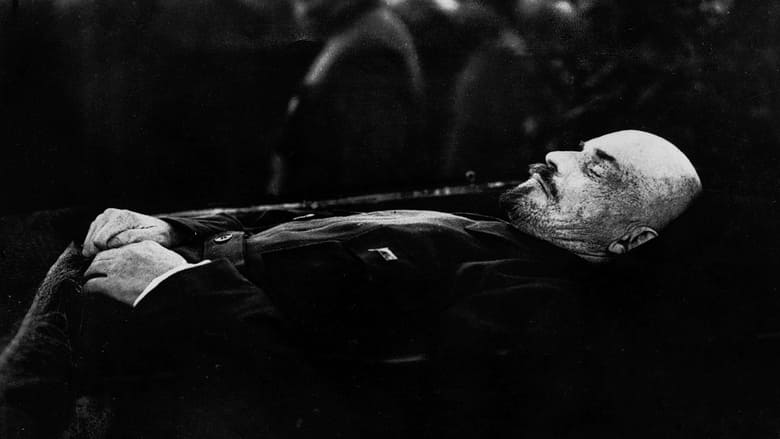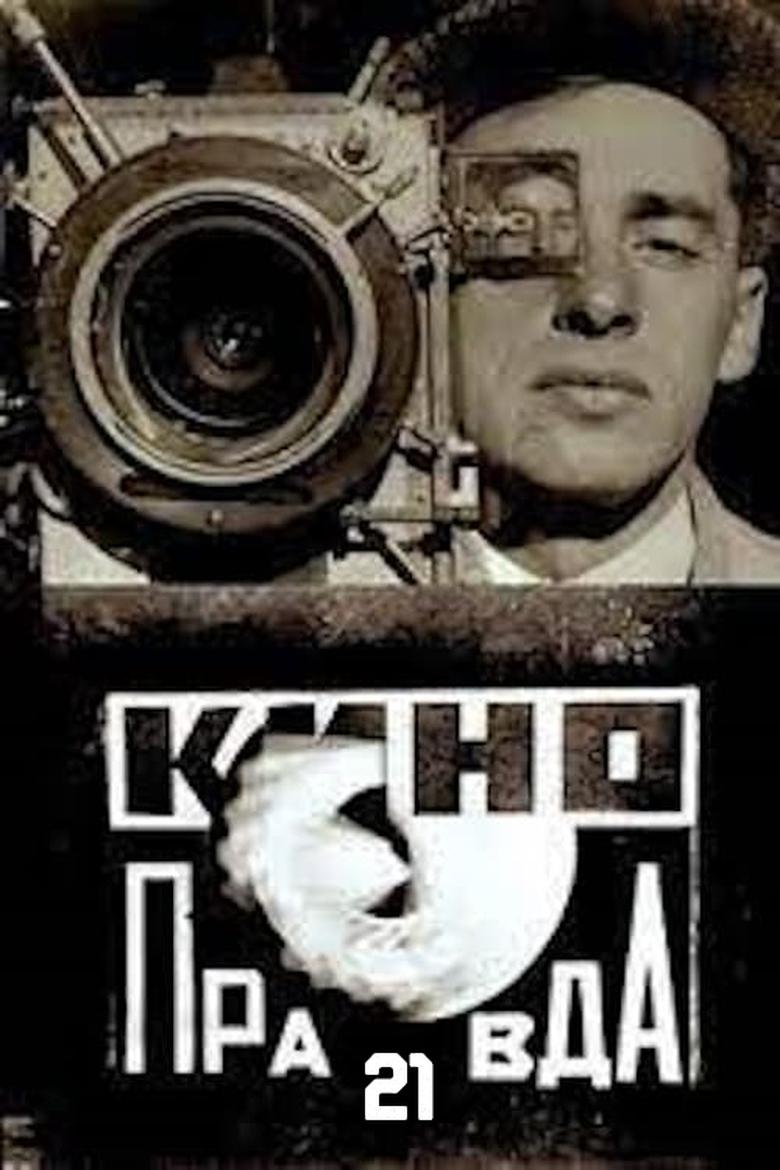

Kino-Pravda No. 21: Lenin Kino-Pravda. A Film Poem About Lenin
Genres
Overview
Dziga Vertov-directed Soviet newsreel made to commemorate the first anniversary of the death of Vladimir Ilich Lenin (21st January 1924 - 1925) drawn from 'The Final Journey', a Pravda feuilleton written on the occasion of Lenin's funeral by the man who had introduced Vertov to cinema, Mikhail Koltsov. Contains: First anniversary of Lenin's death: 1. Assassination attempt on Lenin and Soviet Russia's progress under his leadership / 2. Lenin's illness, death and funeral / 3. The year after Lenin's death
Details
Budget
$0
Revenue
$0
Runtime
33 min
Release Date
1925-01-21
Status
Released
Original Language
Russian
Vote Count
20
Vote Average
5.45
Vladimir Lenin
Himself (archive footage)
Joseph Stalin
Himself (archive footage)
Nadezhda Krupskaya
Herself (archive footage)
Anna Ulyanova
Herself (archive footage)
Felix Dzerzhinsky
Himself (archive footage)
Mikhail Frunze
Himself (archive footage)
Leonid Krasin
Himself (archive footage)
Yemelyan Yaroslavsky
Himself (archive footage)
Mikhail Kalinin
Himself (archive footage)
Clara Zetkin
Herself (archive footage)
Kliment Voroshilov
Himself (archive footage)
Semyon Budyonny
Himself (archive footage)
0.0
Georgie
An ex mobster reflects on love and loss after spending 32 years in prison.
2024-10-04 | en
5.3
Skinningrove
A photographer shares unpublished images chronicling time spent among the 'fiercely independent' residents of a remote English fishing village.
2013-01-18 | en
0.0
Cradle of Genius
Longtime playwrights and performers of the Abbey Theatre share colourful reminiscences of the national institution founded by W.B. Yeats and Lady Gregory in 1904. Oscar Nominee: Best Documentary Short
1960-11-11 | en
6.2
Grandma Moses
1950 short film portrait of the octogenarian folk artist. Nominated for an Oscar in the category "Best Short Subject, One-reel".
1950-10-23 | en
6.1
Gadgets Galore
This Warner Bros. short reviews in an often humorous way the impact of the automobile on the United States. By 1900, the horseless carriage was beginning to have an impact. Early adopters were often the object of attention by large curious crowds. There were many car manufacturers and the quality of their product varied considerably. Traffic jams, pollution and automobile racing were only a few of the outcomes.
1955-07-30 | en
0.0
Una vez iniciado el fuego
Documentary on the recording of the Album Una vez iniciado el fuego by Sakatumba
2024-10-17 | es
5.0
Thoughts and Visions of a Severed Head
The theme of death is heavily interwoven in Smolder’s surreal salute to Belgian painter Antoine Wiertz, a Hieronymus Bosch-type artist whose work centered on humans in various stages in torment, as depicted in expansive canvases with gore galore. Smolders has basically taken a standard documentary and chopped it up, using quotes from the long-dead artist, and periodic statements by a historian (Smolders) filling in a few bits of Wiertz’ life.
1991-01-01 | fr
5.5
Give Us the Earth!
This "Theater of Life" documentary was produced in cooperation with the International Committee, YMCA. It focuses on the work of Dr. Spencer Hatch, as he shows residents of small Mexican villages how to make their land better able to grow food and make them more independent.
1947-06-21 | en
6.7
A New Romance of Celluloid: The Miracle of Sound
This short documentary, presented and directed by MGM sound engineer Douglas Shearer, goes behind the scenes to look at how the sound portion of a talking picture is created.
1940-10-24 | en
4.9
Hymn of the Nations
Hymn of the Nations, originally titled Arturo Toscanini: Hymn of the Nations, is a 1944 film directed by Alexander Hammid, which features the "Inno delle nazioni," a patriotic work for tenor soloist, chorus, and orchestra, composed by Italian opera composer Giuseppe Verdi in the early 1860s. (For this musical work, Verdi utilized the national anthems of several European nations.) In December 1943, Arturo Toscanini filmed a performance of this music for inclusion in an Office of War Information documentary about the role of Italian-Americans in aiding the Allies during World War II. Toscanini added a bridge passage to include arrangements of "The Star-Spangled Banner" for the United States and "The Internationale" for the Soviet Union and the Italian partisans. Joining Toscanini in the filmed performance in NBC Studio 8-H, were tenor Jan Peerce, the Westminster Choir, and the NBC Symphony Orchestra. Preserved by the Academy Film Archive in 2010.
1944-02-01 | en
5.6
Story of a Dog
A dog trains for the battlefield and becomes a crucial part of the United States military. This 1945 short documentary film was nominated for an Oscar for Best Live Action Short, One-Reel.
1945-10-27 | en
5.8
Thirty Million Letters
Thirty Million Letters is a 1963 short documentary film directed by James Ritchie and made by British Transport Films. It was nominated for an Academy Award for Best Documentary Short.
1963-09-15 | en
6.9
Nine from Little Rock
The Arkansas school integration crisis and the changes wrought in subsequent years. This film profiles the lives of the nine African-American students who integrated Central High in Little Rock, Arkansas, during the fall of 1957. The film documents the perspective of Jefferson Thomas and his fellow students seven years after their historic achievement. Central to this story is their quiet but brave entrance into Little Rock High, escorted by armed troops under the intense pressure of the on looking crowd. We learn first hand their impressions of the past and present and their hopes for the future. Their selfless heroism broke the integration crisis and pioneered a new era. This film went on to win an Academy Award® for Best Documentary Short in 1964.
1964-01-01 | en
6.2
Snow
Comprising train and track footage quickly shot just before a heavy winter's snowfall was melting, the multi-award-winning classic that emerged from the cutting-room compresses British Rail's dedication to blizzard-battling into a thrilling eight-minute montage cut to music. Tough-as-boots workers struggling to keep the line clear are counterpointed with passengers' buffet-car comforts.
1963-01-01 | en
6.2
Island of Lemurs: Madagascar
The incredible true story of nature’s greatest explorers—lemurs. Through footage captured with IMAX 3D, audiences go on a spectacular journey to the remote and wondrous world of Madagascar. Join trailblazing scientist Patricia Wright on her lifelong mission to help these strange and adorable creatures survive in the modern world.
2014-04-03 | en
0.0
This was the MARY
Short 18 minute film about QM and her last Transatlantic voyage from New York to Southampton. Joan Crawford makes an appearance and also narrates the first part of the film.
1968-03-01 | en
6.7
Teddy the Rough Rider
This short follows the political career of Theodore Roosevelt, beginning in 1895, when he was appointed police commissioner of New York City. In 1897 he was appointed Assistant Secretary of the Navy. His charge up San Juan Hill during the Spanish-American War in 1898 is re-created. He becomes vice president in March 1901 and assumes the presidency when William McKinley is assassinated six months later. According to the narrator, Roosevelt refused to be beholden to political bosses, doing what he believed to be right for the American people.
1940-02-21 | en
5.7
Beyond the Line of Duty
This short film in support of the war effort focuses on the training and missions of Army Air Corps Captain Hewitt T. Wheless just after the U.S. entry into World War II.
1942-11-07 | en
4.2
The Apple-Knockers and the Coke
Much of Hunter's fame was built upon her resemblance to Marilyn Monroe; indeed, her Playboy pose was obviously inspired by Monroe's notorious 1949 nude photo session with Tom Kelley from which her own Playboy photo came. The similarity in look between Hunter and Monroe also came into play when a nude Hunter starred in a film short called Apple Knockers and Coke. For many years there have been those who have seen the film and have mistaken Hunter for Monroe.
1948-01-01 | en
6.0
Growing Girls
After several farmyard analogies featuring chicks and calves, the well-spoken narrator and director of the film, Winifred Holmes, considers the subject of girls and how they reach adulthood and readiness for the 'important job of motherhood.
1949-11-15 | en